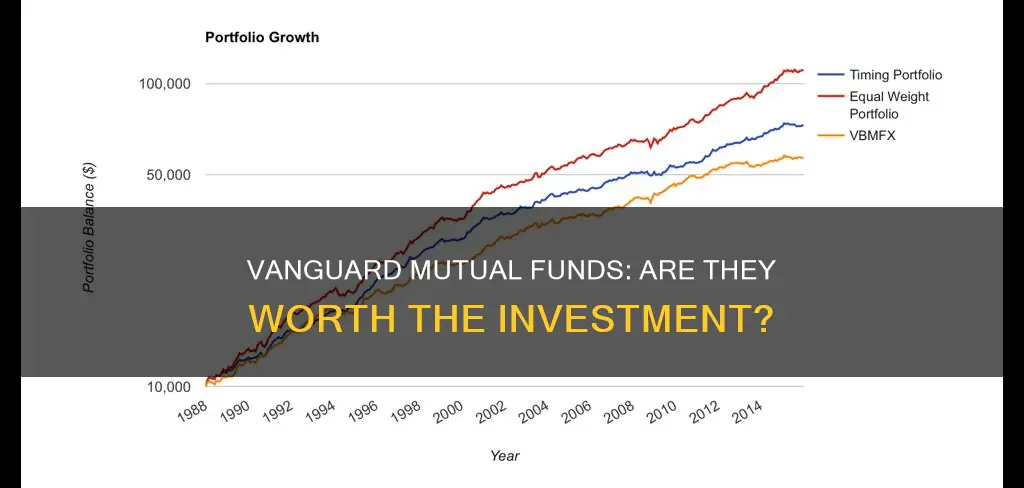
Vanguard is a U.S. asset management company that offers both mutual funds and ETFs. As of 2024, Vanguard is among the largest providers of mutual funds worldwide. Vanguard's mutual funds are widely popular thanks to their reputation for low costs and high quality. The company offers a wide array of investment choices, including roughly 200 mutual funds in the U.S. alone.
Vanguard's mutual funds are known for their simplicity and cheap fees. They are also highly diversified, tax-efficient, and convenient. The company's average expense ratio across its index mutual funds and ETFs is 72% lower than the industry average.
Vanguard's mutual funds can be categorised into two types: index mutual funds and actively managed funds. Index funds are passively managed and designed to follow a market benchmark like the S&P 500 Index or Dow Jones Industrial Average. Actively managed funds, on the other hand, are managed by fund managers who handpick the fund's investments in an attempt to beat the market.
Some of the best-performing Vanguard mutual funds include the Vanguard Mega Cap Growth Index, the Vanguard Russell 1000 Growth Index Fund, and the Vanguard Total Stock Market Index Fund.
When it comes to return on investment, it's important to consider factors such as the fund's expense ratio, turnover rate, and investment strategy. A buy-and-hold investor, for example, would favour funds with low turnover and low expenses.
Vanguard's funds offer investors a wide range of options to suit their financial goals, whether they are looking for long-term growth, income generation, or a balanced portfolio of stocks and bonds.
| Characteristics | Values |
|---|---|
| Average expense ratio across index mutual funds and ETFs | 72% lower than the industry average |
| Average expense ratio across index ETF and mutual fund | 0.05% |
| Industry average index ETF and mutual fund expense ratio | 0.18% |
| Average annual return of Vanguard Total Stock Index since its inception | 10.31% |
| Average annual return of Vanguard Total Stock Index Admiral Shares since their inception | 8.01% |
| Vanguard Total Stock Index Admiral Shares expense ratio | 0.04% |
| Vanguard Total Stock Index Admiral Shares minimum investment | $3,000 |
| Average annual return of Vanguard Russell 1000 Growth Index Fund | 36.3% |
| Average annual return of Vanguard FTSE Social Index Fund | 4th best among Vanguard's US large-cap blend funds |
| Average annual return of Vanguard Growth & Income Fund | Beaten the S&P 500's average annual return by a small margin |
| Average annual return of Vanguard High-Yield Corporate Fund | 11.74% |
| Average annual return of Vanguard Explorer Fund | 0.59% |
| Average annual return of Vanguard Wellington Fund | Among the best of the company's balanced funds |
| Average annual return of Vanguard Tax-Managed Capital Appreciation Fund | Among the company's top-performing tax-managed portfolios |
What You'll Learn

Vanguard's average expense ratio
When it comes to investing, expense ratios are an important factor to consider as they represent the operational costs incurred by mutual funds and ETFs, which directly affect your investment returns. Vanguard's average expense ratio is notably lower than the industry average, and here's a closer look at what that means for your investments.
Vanguard is known for its low-cost investment approach, and this is reflected in its average expense ratio. As of December 31, 2023, Vanguard's average mutual fund and ETF (exchange-traded fund) expense ratio was 0.08% according to Vanguard and Morningstar, Inc. This is significantly lower than the industry average mutual fund and ETF expense ratio of 0.44% for the same period. When comparing averages, it's important to note that industry averages exclude Vanguard, given their unique structure as a client-owned company.
How Vanguard Keeps Costs Low:
Vanguard's unique structure as a client-owned company plays a crucial role in keeping costs low. Unlike traditional investment firms, Vanguard does not have external shareholders, so they can prioritize keeping expenses low for their clients. This structure has been a key part of their business model for over 40 years.
Additionally, Vanguard offers commission-free trading for their mutual funds and ETFs when bought and sold online through a Vanguard account. This further reduces the costs associated with investing, allowing you to keep more of your investment returns.
The Impact of Expense Ratios:
Expense ratios are often overlooked, but they play a crucial role in your investment returns. These expenses are deducted from the fund's total value regularly and directly impact your bottom line. While they may not seem significant at first, these costs can add up over time, especially when compared to lower-cost alternatives.
By choosing investment options with lower expense ratios, you can maximize your investment returns. This is why Vanguard's low-cost approach is advantageous for investors, as it allows you to keep more of your investment earnings.
In summary, Vanguard's average expense ratio of 0.08% is significantly lower than the industry average. This low-cost approach is a key advantage of investing with Vanguard, as it helps maximize your investment returns by minimizing the operational costs associated with mutual funds and ETFs. By understanding the impact of expense ratios, you can make more informed investment decisions and choose options that align with your financial goals.
Index Funds vs Roth IRA: Where Should You Invest?
You may want to see also

The difference between active and index mutual funds
When considering investing in Vanguard mutual funds, it is important to understand the difference between active and index funds.
Active Mutual Funds
Actively managed funds are those in which fund managers handpick the fund's investments in an attempt to beat the market. Vanguard's actively managed funds are distinguished by their meticulous selection of talent, consistent investment strategy, and client-first focus. The portfolio manager of an actively managed fund performs an in-depth analysis of many investments to try to outperform the market index, such as the S&P 500. The potential to outperform the market is one advantage that actively managed funds have over index funds, and this notion of outperformance is attractive to investors.
However, evidence that actively managed funds can consistently outperform their relevant index is difficult to find. It is challenging for an individual investor to identify which actively managed fund will outperform the index in a given year. Actively managed funds also tend to have higher fees, with an average ongoing management expense that is 1% higher than that of passively managed funds. Additionally, the active buying and selling of stocks by the fund manager result in taxable capital gains for the fund shareholders if the fund is owned in a non-retirement account.
Index Mutual Funds
Index funds, also known as passively managed funds, are designed to follow a market benchmark like the S&P 500 Index or Dow Jones Industrial Average. The manager of an index fund aims to mimic the returns of the index it follows by purchasing all or almost all of the holdings in that index. As a result, index funds are passive investments, meaning the fund manager does not actively pick stocks by buying and selling securities. Instead, they select a combination of assets intended to replicate an index. Because the fund's underlying assets are held and not actively traded, operating expenses are typically lower than those of actively managed funds.
Vanguard's index mutual funds offer benefits such as diversification, tax efficiency, and low costs. The Vanguard Russell 1000 Growth Index Fund, for example, charges a very low expense ratio of 0.07% and has outperformed the S&P 500 over the past decade.
In summary, the choice between active and index mutual funds depends on an individual's circumstances and financial objectives. While active funds offer the potential for higher returns, index funds tend to have lower fees and often provide more stable long-term performance.
Bond Fund Investment: What Percentage is Smart to Invest?
You may want to see also

Vanguard's ESG funds
Vanguard's ESG (environmental, social, governance) funds allow investors to put their money in funds that align with their personal preferences and values. These funds consider environmental, social, and governance issues, and the term ESG investing is often used interchangeably with "socially responsible investing (SRI)" and "sustainable investing."
Vanguard currently offers seven ESG products: four exclusionary index funds and three actively managed funds. The exclusionary index funds avoid or reduce exposure to specific industries with heightened ESG-related risks, such as firearms, tobacco, or fossil fuels, while seeking market-like returns. The three actively managed funds, on the other hand, seek to generate excess returns by allocating capital to companies with leading or improving ESG practices.
- ESGV ESG U.S. Stock ETF (Indexed, approx. 1,500 stocks)
- VFTAX FTSE Social Index Fund (Indexed, approx. 500 stocks)
- VSGX ESG International Stock ETF (Indexed, approx. 3,000-4,000 stocks)
- VCEB ESG U.S. Corporate Bond ETF (Indexed, approx. 200-300 bonds)
- VBPIX Baillie Gifford Global Positive Impact Stock Fund (Actively Managed, approx. 25-50 stocks)
- VEOIX Global Environmental Opportunities Stock Fund (Actively Managed, approx. 25 stocks)
- VEIGX Global ESG Select Stock Fund (Actively Managed, approx. 40-50 stocks)
It is important to note that ESG funds are subject to ESG investment risk, where the screened stocks or bonds may underperform the market as a whole or trail returns of other ESG funds.
Maximizing Your HSA Funds: Smart Investment Strategies
You may want to see also

The benefits of Vanguard's index funds
Vanguard is a U.S. asset management company that offers both mutual funds and ETFs. The company's mutual funds are well-known for their low costs and high quality. Vanguard's average expense ratio for its index mutual funds and ETFs is 72% lower than the industry average.
Low Costs
Vanguard's index funds have exceptionally low expense ratios, which means you keep more of the money you make. For example, the Vanguard S&P 500 ETF (VOO) has an expense ratio of just 0.03%. The average expense ratio across Vanguard's index funds and ETFs is 0.05%, compared to the industry average of 0.18%.
Diversification
Index funds invest in a wide range of securities, providing diversification and reducing risk. A single Vanguard index fund can hold hundreds or even thousands of individual stocks or bonds, ensuring your portfolio is not overly exposed to any one security.
Simplicity
Vanguard's index funds offer a simple, passive investment strategy. They are designed to track a market benchmark, such as the S&P 500, rather than trying to pick and choose the best stocks. This makes them a straightforward way to gain exposure to the overall market or specific market sectors.
Tax Efficiency
Vanguard's index funds can be more tax-efficient than actively managed funds. The low turnover of these funds means you may have fewer capital gains to report on your tax return. Additionally, some Vanguard index funds focus on tax-managed strategies, further enhancing their tax efficiency.
Long-Term Performance
Vanguard's index funds are well-suited for long-term investors. The passive nature of these funds means they are designed for buy-and-hold strategies, allowing you to track the performance of a particular market or sector over the long term.
In summary, Vanguard's index funds offer a range of benefits, including low costs, diversification, simplicity, tax efficiency, and the potential for strong long-term performance. These funds provide a convenient and low-risk way to invest in the stock market, making them a popular choice for investors.
Dave Ramsey's Investment Strategy: Specific Fund Choices
You may want to see also

Vanguard's actively managed funds
Vanguard has a long history of offering actively managed funds, dating back to its inception in 1975 when its first 11 mutual funds were actively managed. Today, Vanguard manages over $1.7 trillion in active assets, offering more than 70 U.S.-based actively managed funds across a range of stock, bond, and balanced funds for both U.S. and international investments.
Actively managed funds at Vanguard aim to beat market returns by leveraging the expertise of professional money managers who hand-pick investments. Vanguard's disciplined investment approach and focus on long-term value creation guide these decisions, ensuring that excessive risks are not taken. The company's scale and reputation allow it to attract top talent, both internally and through partnerships with leading global investment managers.
The performance of Vanguard's actively managed funds has been impressive, with 91% of these funds outperforming their peer-group averages over the past 10 years. This track record reinforces the potential for outperformance in these funds, although it's important to remember that there is also a chance of underperformance.
When considering Vanguard's actively managed funds, it's essential to assess your risk tolerance and investment goals. These funds introduce the risk of the portfolio manager underperforming their benchmark, and they tend to have more taxable capital gains due to more frequent trading. However, they offer the potential for higher returns and can be a valuable component of a well-diversified, balanced portfolio.
Vanguard Windsor II: Uncovering its Security Strategy
You may want to see also
Frequently asked questions
A mutual fund is a collection of investors' money that fund managers use to invest in stocks, bonds, and other securities. Mutual funds are typically more diversified, low-cost, and convenient than investing in individual securities, and they're professionally managed.
The return on investment for Vanguard mutual funds depends on the specific fund and the time period in question. For example, the Vanguard Russell 1000 Growth Index Fund had a one-year return rate of 36.3% as of June 2024. The Vanguard Explorer Fund has had an impressive average annual return over the past decade, making it Vanguard's top-performing diversified U.S. small-cap portfolio. The Vanguard Wellington Fund, Vanguard's oldest mutual fund, has returned an annualized 8.3% since its inception in 1929.
Vanguard mutual funds offer high-quality, low-cost investment options that fit a variety of investing needs and strategies. They are known for their simplicity, diverse investment options, and low fees. Vanguard's average expense ratio across its index mutual funds and ETFs is 72% lower than the industry average.
When choosing a Vanguard mutual fund, it's important to consider your savings goals, risk tolerance, and investment time horizon. You should also decide if you want an index fund or an actively managed fund. Vanguard offers a wide range of mutual funds, including passive index funds and actively managed funds, so you can find one that aligns with your investment goals and strategy.







